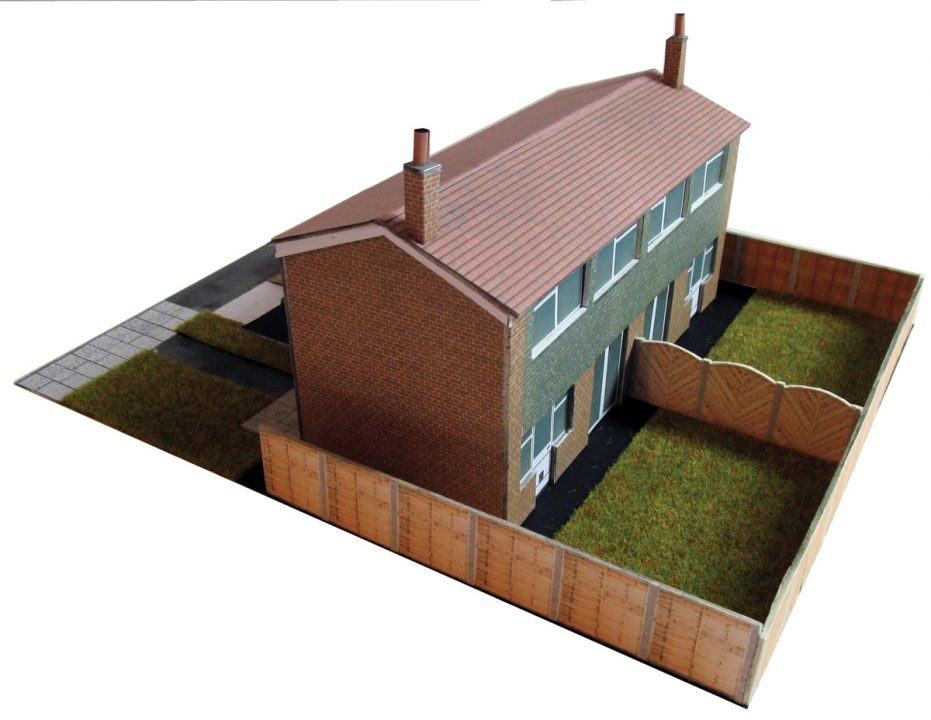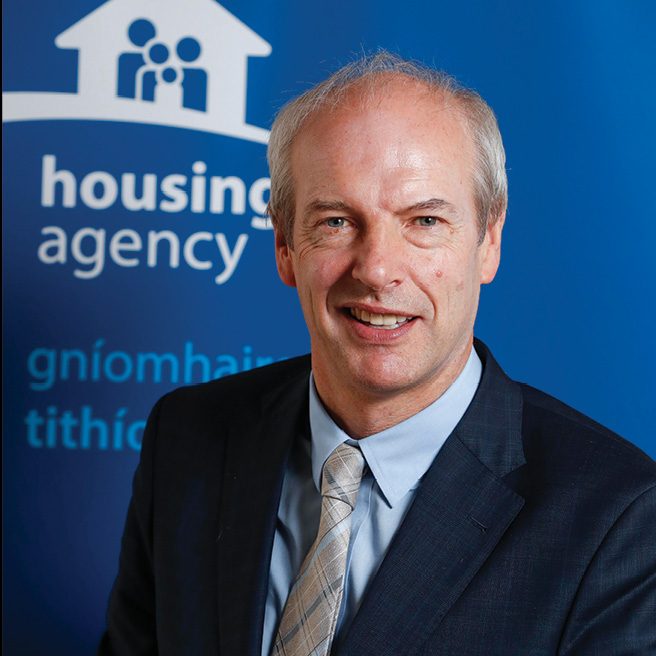
CSO publishes breakdown of Census 2016 housing themes
19th July 2017
HAP: a growing success story within the private rental sector
19th July 2017Fingal County Council’s strategy on housing is delivering
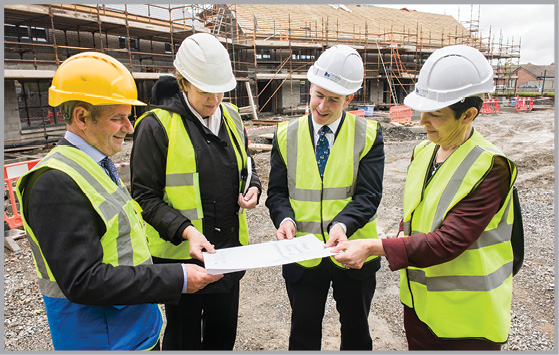
Chief Executive of Fingal County Council Paul Reid outlines the county’s progress in tackling the housing crisis.
 Situated within the expanding Greater Dublin Region, with the fastest growing and youngest population in Ireland, Fingal County Council is in the frontline of the current housing crisis.
Situated within the expanding Greater Dublin Region, with the fastest growing and youngest population in Ireland, Fingal County Council is in the frontline of the current housing crisis.
We have been recognised as one of the best performing councils by Government and it has responded by providing us with extra funding so we can maintain the pace we have set.
Under the Social Housing Strategy 2020 Fingal had a target to deliver 1,376 Social Housing Units over the period 2015-2017. This was supported by €81 million of Government funding from the €800 million allocated nationally. By 31 May 2017, using various mechanisms, Fingal had delivered 1,288 units with a further 700 approved thanks to additional government funding. This is approximately 45 per cent additional units being delivered.
Specific targets under the Rebuilding Ireland plan have not yet been assigned but we already have comprehensive programmes in place under each of the five pillars. The previous minister Simon Coveney and Minister of State Damien English both visited Fingal to hear and see what we are doing and I have already had several meetings with the new minister Eoghan Murphy.
There is widespread acknowledgement that tackling a housing waiting list with 7,865 people on it is not an easy task especially in an environment where the country is coming out of recession, the construction industry is emerging slowly from hibernation and the public service is operating with reduced resources.
Homelessness has emerged as a major issue within the housing crisis and we are working with our partners in the Dublin Regional Homeless Executive (DRHE), Approved Housing Bodies and the Housing Agency to deliver long-term sustainable housing solutions for people who have been affected by homelessness. Family Hubs will provide quality family accommodation as an alternative to commercial hotels while we work to provide long-term tenancy solutions. In addition, the Housing Assistance Programme (HAP) has now been rolled out in Fingal and is another means of supporting people in finding accommodation.
In Fingal we put a lot of time and focus into managing projects through to completion. This is supported by strong project management processes as initiatives move from the architects through to housing completion. This may seem basic but housing delivery can be a complex process and putting a relentless focus on all stages of the process has proven successful for us.
A major element of our strategy has been to bring forward plans to the elected members on a regular basis for building social housing units on land in the ownership of the council and we are also working with the newly established Housing Delivery Office to develop some of our largest land banks.
Our current construction programme is for 630 units in 26 schemes of which nine have either been delivered or are under construction. Our programme includes three Rapid Build projects which will deliver 87 units and other potential sites for this method of construction have also been identified.
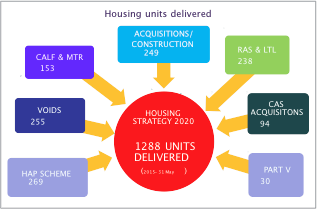
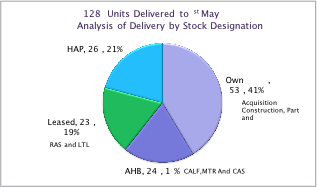
Fingal has also been very active in purchasing units from a wide range of sources, including NAMA, banks, receivers and individuals. Over the past two years we have purchased 222 units for allocation to people in emergency accommodation or on our housing list and we are in the process of acquiring another 54.
We have also actively entered agreements with developers so that we get 10 per cent of the planned units to be built on private developments. These ‘Part Vs’, as they are known, ensure that the focus for the Council is on getting actual units rather than other deals that may not see units delivered. In some cases we have gone beyond the 10 per cent allocation and purchased additional units.
Sites cannot be developed if the proper infrastructure, such as roads, water, sewage and electricity, is not in place. The €200 million LIHAF funding announced by Minister Coveney earlier this year was certainly welcome. In Fingal, we received approval for three projects which will unlock the potential for 2,800 houses to be developed by 2021 and 6,900 over the long-term. There are currently planning permissions in place for 10,000 units across Fingal and we have carried out a thorough assessment of the various constraints across the county that need investment to facilitate development. Our 2017-2022 Development Plan is now in place and provides for over 1,700 hectares of residentially zoned land with the capacity for 49,000 homes.
We also compile regular surveys of the number of sites for housing development across the county. This includes understanding the various stages of each project and the number of units actively being built. Currently we have 49 active sites across the county and we liaise closely with the developers on any issues that arise so that we can ensure a continuous pipeline of completed houses.
One of the most challenging elements has been Long Term Lease and Rent Accommodation Supplement (RAS). Getting available units from landlords for long-term leasing has proven very difficult and extended supports from Government for people on long-term leasing is welcomed.
The 2016 Census identified 3,000 potential vacant properties across Fingal so, following the introduction of the Government’s Build and Repair and Lease and Repair Schemes, we drew up a Vacant Homes Strategy to tackle the problem in Fingal. Our inspectors carried out an intensive audit, narrowed the number of actual vacant properties to under 300 and are currently working on identifying the owners.
In 2014, Fingal had over 220 blocked-up units across the county waiting to be brought back to standard. At the end of May 2017, we had 57 of which 18 are in the process of being offered for letting. Voids now represent less than 1 per cent of our social housing stock which we classify as “normal churn” as houses are handed back to us, refurbished and reassigned. Our success in this regard has been due to changing the process and specification of all works to be completed and engaging an external contractor to complete these works.
There has tended to be a lot of public criticism, from many sources, that the Local Authorities have been too slow to react to the current housing crisis. In the case of Fingal, we have mobilised comprehensively, had good support from the elected members and department officials, and our staff have stepped up to the mark in an exceptional manner. The Rebuilding Ireland programme has given us a template to work to but it is only that. There is no magic wand to be waved in order to solve the housing crisis overnight. It will take time, but we will get there!
Contact
:
Paul Reid is Chief Executive of Fingal County Council
Tel: 01 890 5000
Web: www.fingal.ie

